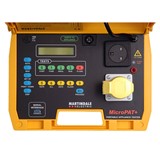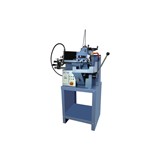By Steve Kay, Meat & Poultry, Sosland Publishing Co.
BPI is manufacturing the equipment, designed by affiliated Freezing Machines, Inc., at its South Sioux City, Neb., plant. To date, FMI has installed three of its massive grinders in plants that make meat patties for fast-food leader McDonald’s. It aims to have FMI grinders in all six U.S. plants that grind beef for McDonald’s by the first quarter of 2006. In addition, FMI will soon install its grinding systems at National Beef Packing Co.’s plants in Dodge City and Liberal, Kan.
FMI’s machines produce ground meat, but that is where the comparison with conventional grinding equipment ends. Similar to the way BPI pioneered its Boneless Lean Beef Trimmings production, FMI’s equipment goes beyond anything used before. The grinders are massive pieces of machinery, weighing 70 tons per unit. They are designed to be low maintenance and capable of producing ground meat at a quality and quantity not possible with conventional grinding equipment.
For those who know the story of parent company BPI, it is no surprise that founder and president Eldon Roth and his team have taken this next step. A tour of any of BPI’s four processing plants leaves visitors open mouthed at what BPI has created. BPI not only developed a high-quality product from under utilised trimmings, it convinced skeptics, from government to end users, that its boneless lean beef trimmings was a product of considerable value.
By the end of September, BPI’s boneless lean beef was in as much as 80 percent of the U.S. domestic ground beef supply (typically utilised at 15 to 25 percent of the meat block), says Roth. BPI in the past two years has reaped the rewards of an extremely tight supply of domestic lean manufacturing beef due to record low cow slaughter. BPI’s 2004 sales totaled $400 million, and in 2005, sales are expected to exceed $500 million. Its four plants annually transform 1.8 billion pounds of fresh beef trimmings into 450 million pounds of BPI’s Boneless Lean Beef Trimmings and 1.1 billion pounds of edible tallow.
The next McGeneration
For years, BPI has teamed up with quick-service restaurants to incorporate its boneless trimmings into their ground beef formulas. Now, BPI and FMI are finding major support for their "new generation" grinders from McDonald’s. FMI’s first grinder was installed at Otto & Sons’ (a unit of OSI Industries) Salt Lake City, Utah, plant. The second grinder was installed at OSI’s West Chicago, Ill., plant. Both OSI plants produce ground beef patties. The third grinder that was installed at Lopez Foods, Oklahoma City, Okla., was for pork sausage patties.
As noted, McDonald’s intends to have FMI grinders in all six of the plants that manufacture its beef patties by early 2006. It wants to install the equipment in three pork sausage patty plants by mid-2006. And it is examining the feasibility of putting smaller versions of the equipment in suppliers’ plants in Germany, Australia and Japan.
What propelled BPI to take this giant leap into equipment manufacturing? "Over the years, we couldn’t get what we needed from conventional machinery suppliers in terms of durability and sanitation, so we took the matters into our own hands," says Roth. "After experiencing too many bearing and shaft failures as well as clean-in-place problems, we decided to put our engineering know-how to work producing our own pumps and grinders."
Part of the master plan was to reduce labour and keep production lines running longer. That's because all processors face the issue of finding qualified line operators as well as maintenance crews to keep the lines running. "The time for the meat processing industry to use minimum wage labour and toy machinery is over," says Roth.
FMI set out to design and build the most durable, reliable stainless steel equipment it could. "The advantage of building our own machinery is that we can design the equipment to meet our own specifications and standards; thus, the parts won’t suffer as much wear and equipment will run longer," says Roth. "We’re not competing on first cost but against long-term costs of machinery downtime, poor product quality and sanitation attributes."
BPI currently employs more than 40 designers, engineers and machinists at its South Sioux City plant. BPI uses its own expansive machine shop to manufacture only a small portion of the equipment’s parts, while 90 percent of the parts are made by outside contractors. BPI customises parts to meet its requirements. For example, it coats all gearboxes and motors in blue polymer to eliminate rust and paint flaking.
These parts are made of cast steel, and Roth would like to see them made of stainless steel. "For a 100-horsepower motor, stainless steel would add about 10 percent, or $440, to the cost," he says. Roth is so enamored with the attributes of stainless steel that BPI is building an all-stainless steel mini-pilot plant inside its South Sioux City boneless beef facility. The 5,800-square-foot room is made entirely of 3/8-inch stainless steel plate.
FMI’s equipment has to satisfy economics, food safety and product quality, says Roth. The FMI grinding system works on a somewhat different principle than a conventional grinder. Special design features allow it to produce consistent meat rather than smeared, overworked meat, according to Roth. It is designed to produce 60,000 pounds per hour or more. Efficiencies in the plants using the FMI grinder have increased as much as 10 percent in terms of pounds per day and meat consistency, he says. The design also incorporates improved defect removal processes and eliminating rework.
McDonald’s is not talking about why it is moving to the FMI equipment, but it apparently expects to get a yield advantage of at least 0.2 percent, less defects, fewer claims and overall quality improvement. That is in addition to the efficiencies noted above of more meat through the system. McDonald’s is also believed to be looking at the equipment’s application for producing chicken nuggets, which are also a ground meat product.
Most existing grinders run well when they start each day; however, they tend to clog during the production run, and the product degrades and increases in variable quality, says someone who has seen the FMI machines operating. "The FMI equipment avoids this tremendous variability because it retains the raw material’s moisture, and it uses less pressure than a conventional grinder. So you get a better-textured product. This means the patty is moister, retains heat better and cooks better."
Installing an FMI grinding system is a massive under taking. Installation at Lopez Foods took just 84 hours, from removal of old equipment to complete set-up and testing of the new machinery. The job involved about seven semitrailer loads of equipment. BPI had 42 people on site. In OSI’s plant in West Chicago, the FMI grinding system replaced four conventional grinders.
FMI is aware of the importance of keeping production lines running, so it installs duplicate machinery alongside the main equipment to minimise downtime. "If something breaks down, we would remove the equipment and take it back to our South Sioux City plant for repair, while continuing operations through the systems dual design," says Roth.
In addition, all equipment can be connected to the operations centre at BPI’s headquarters. This centre currently monitors nine locations, but the number can be infinite and can be worldwide, says Roth. The system, which uses dedicated telephone lines, monitors more than 500 different aspects of a single operation. BPI is also putting in video surveillance in some of those operations.
"The system means I can be in Australia and use a handheld device to slow down or speed up a motor in our plant in South Sioux City," says Roth.
FMI equipment is available through a lease program. Companies can also partially pay for the equipment and pay a certain amount per pound of material produced. In return, FMI will monitor, repair and supply parts, including plates and knives for the system.
FMI’s grinders currently lend themselves to the largest ground meat production systems, says Roth. However, FMI is also working on building and supplying much smaller machines that will still have all the features of the large ones.
In the meantime, BPI is also looking to move into custom ground beef production for other companies. It also plans to build a bio-diesel plant in South Sioux City to turn the fat into fuel.
"There are 3 million pounds of fat produced in this area every day by BPI, Tyson Foods, John Morrell and others," says Roth. "We aim to use that fat to produce 45 million gallons of biodiesel per year." Based on what BPI and Roth have accomplished to date, it appears a strong likelihood that BPI will soon add "alternative fuel manufacturer" to its name.







